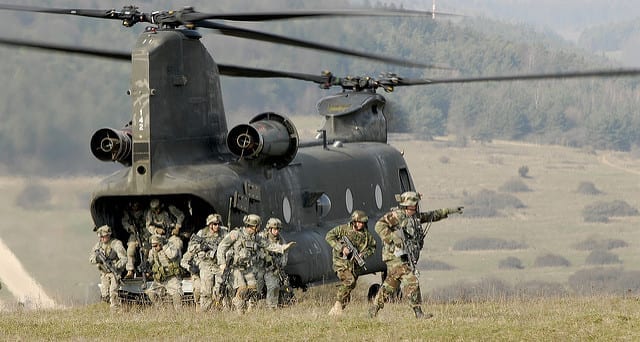When God gave him his deployment orders, however, Moses doubted his ability to accomplish the mission.
But Moses said to God, “Who am I that I should go to Pharaoh and bring the children of Israel out of Egypt?” (Exodus 3:11)
A Fear
The very word “DEPLOYMENT” can strike fear into the heart of the bravest and most independent military spouse. Deployment can mean a call to guard a hostile border, battle militant terrorists, combat illegal drugs, and fight deadly disease.
Any complaint or protest invites the response: “You should have known what you were getting into” or “Don’t be surprised, this is what you signed up for.” When deployment orders arrive, the last thing I want to hear is, “Put on your big-girl panties and deal with it.” Give me time. I will get there. (O Lord, please let me get there!)
 Another dreaded D word that can accompany deployment is doubt. My personal deployment convoy included a line of doubts about my ability to navigate the terrain ahead.
Another dreaded D word that can accompany deployment is doubt. My personal deployment convoy included a line of doubts about my ability to navigate the terrain ahead.
Sister, you can take comfort in the fact that a number of biblical heroes started out struggling with doubt when their orders arrived. We remember Moses as a powerful leader who performed miraculous events with the anointing of God.
Doubt to Hope
When God gave him his deployment orders, however, Moses doubted his ability to accomplish the mission. The book of Psalms holds some deep expressions of doubt. David, one of Israel’s greatest and most courageous heroes, wrote many of the Psalms.
How long must I take counsel in my soul and have sorrow in my heart all the day? How long shall my enemy be exalted over me? (Psalm 13:2)
I had said in my alarm, “I am cut off from your sight …” (Psalm 31:22)
O LORD, how many are my foes! Many are rising against me; many are saying of my soul, there is no salvation for him in God. (Psalm 3:1–2)
When you read the above Psalms in their entirety, you see that though David questioned God’s presence, he did it from the perspective of knowing this truth: God was present. Even though things around or within were not as they should be, God was with him.
He took his doubts to the source of his hope. In his honesty, he found a deeper relationship with God. The psalms written by David do not end with doubt—they end with hope.
If you think about it, we always judge heroes for where they end up, not where they start. Doubts at the beginning of deployment do not have to end up as defeat at the end of deployment. Instead, God can transform such doubts into maturity and confidence.
Respond
What doubts might you have concerning the challenges ahead? Heroes such as Moses and David doubted. How do these examples encourage you? Read Psalm 13 and write in a journal what you learn about doubt and hope.
Prayer for the Journey
Lord, in the midst of my doubts and fears, remind me of your steadfast love. I confess my doubts to you and ask you to strengthen my faith. Amen.
4 Peter Enns, Exodus: The NIV Application Commentary (Grand Rapids: Zondervan, 2000), 55.






